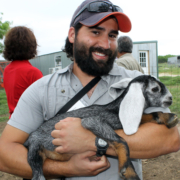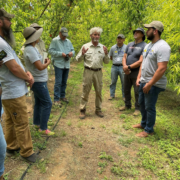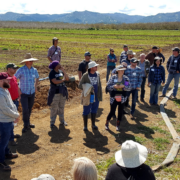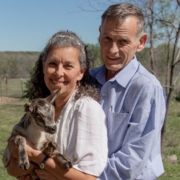Missouri Army Veteran Finds New Mission in Sustainable Agriculture
Dustin Cook left the U.S. Army in 2014 after a decade as an active-duty serviceman and later officer. He’s one of more than 350,000 veteran or active-duty service members involved in farming in the United States. He’s also among an elite group of about 900 farmer veterans who have completed the Armed to Farm training program first launched in 2013 through a cooperative agreement with USDA-Rural Development. Armed to Farm is funded in part by ATTRA.
Now, Cook runs the Veteran’s Urban Farm in Columbia, Missouri. It’s part of a nonprofit organization called the Columbia Center for Urban Agriculture. In coordination with the Truman VA Hospital, the Veteran’s Urban Farm provides veterans with therapeutic, vocational, and recreational horticulture training and activities. Cook says veterans learn everything from starting seeds to managing a market stand. Everything the veterans grow at the 1.3-acre urban farm is harvested and donated to fellow vets once per week at the local VA.
Cook describes struggling to transition from active-duty military life to finding his place in a civilian world, noting that sustainable agriculture was one piece that has given him a new mission and passion.
“It’s given me a lot of drive to help other veterans dealing with those same transition struggles,” he says. “I have a real passion for helping other folks – they don’t have to muddle through by themselves – I can say I’ve been where you’re at.”
Cook attended a week-long Armed to Farm training in Fayetteville, Arkansas, in 2021. Once he returned, he says he talks to any farmer-veteran looking for beginning farmer resources, encouraging them to turn to ATTRA and Armed to Farm.
“The thing that really makes Armed to Farm better than the rest is that it’s the complete package. They do a really good job of presenting a lot of information and resources in a short amount of time while also creating interface time with local veteran farmers,” Cook explains. “The fact that all of that is provided free of charge is a huge benefit – there’s a barrier to entry in ag and finance is one of the biggest parts of that, so being able to go for free and learn as a veteran getting into agriculture – that’s just absolutely invaluable.”

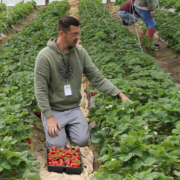
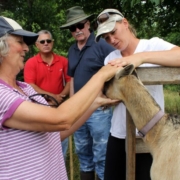
 Canva Pro
Canva Pro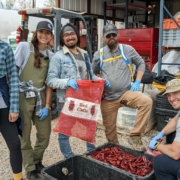
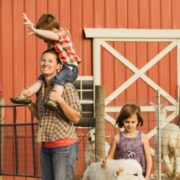 Courtesy Alvina Maynard
Courtesy Alvina Maynard